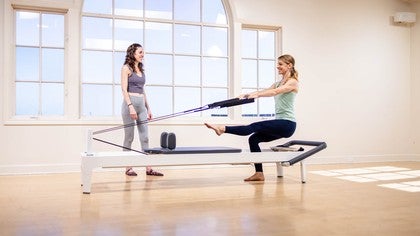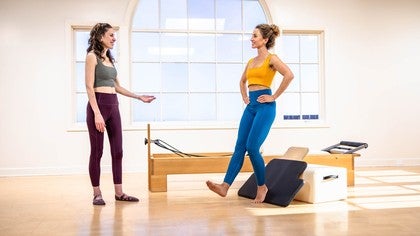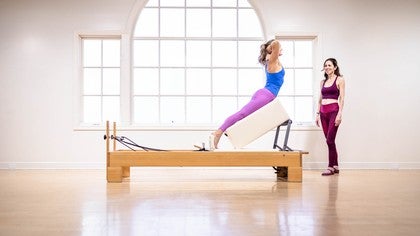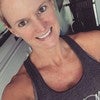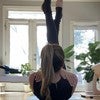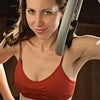Description
If you want to use these ideas in a full class, you can try Mariska's Chest and Glute Strengthening Reformer.
About This Video
Transcript
Read Full Transcript
Hey. I'm Ryska, and I wanted to talk a little bit about thinking outside of the reformer to do strength training exercises on it that you might only see in a gym, but you actually have the capacity to do them with the reformer that you might have in your home or studio. So clearly, this is her former. I have Julia here. She's gonna be helping me out. But first, I wanna talk just quickly about how I would structure a strength training session versus how I would structure a pilates session.
So obviously with pilates, we have flows that we generally do. Most of them are based on, you know, the original Jo Pilates order. Of doing things. In terms of strength training, what I like to do is paired sets. I like to do an upper body push or pull with a lower body push or pulse.
So that would mean I would do, like, a set of pull ups and mix that in with squats. So pull up squats, pull up squats, pull up squats, whether you're doing 3 sets, 6 sets, however many sets that you're doing, And then I would usually only do 6 exercises and a workout. So there would be a structure of upper body push pull, lower body push pull, something that flips that, and then what I would call, like, accessory workouts. So an accessory thing would be just pure core or it would be something small like rotator cuff muscles. And the reason I like to structure it like that is because then you're getting the blood flowing from, like, upper body to lower body, upper body to lower body, upper body to lower body, and it becomes a cardiovascular workout at the same time.
Now an important thing about strength training that we have that's different from the Pilates training world is that we tend to go much, much, much heavier And a lot of us who learned Pilates a certain way, their spring settings, right, we're like, this is done on 1 red spring, and this is done on 2 red springs. And maybe we might move it by, like, a, like, a half spring or whatever, but most of us can move heavier than we're actually moving. And as long as it feels okay, going heavier is good for you. It helps with bone density. I had cancer this year, and so that's actually a big concern is that if you have cancer come back, you don't want it to come back in your bones.
So you wanna make sure that your bones are as strong and healthy as they can be. So I'm gonna demonstrate some exercises with Julia first using just the reformer, but then we're gonna start using some other stuff that you have probably if you also have her former. So first thing is I she is very small, and we are going to just do some seated rows on what the Pilates world thinks that exercise probably should be. And then we're gonna go way heavier than what that is. So I would say give me, like, one red spring and then have a seat, and you can just kind of send your legs through.
And just grab hold of the straps. Perfect. Yeah. Just hold on like that. Okay. So Just your row. Hold towards you. Is that heavy? Is that hard in any way? Okay.
Go ahead and Keep your arms forward, but let it come all the way in. So I'm gonna start adding some weight onto that. Okay. Try it now. And try to keep your body upright to start. So now we're on 2 springs.
How does that feel? Okay. It feels better. It feels better when it's heavier sometimes because it's giving you more feedback. I think you can go heavier than that. So go ahead and come in just to, like, let me be able to make some spring adjustments.
K. Try it from there. How does that feel? Feels heavy. This is 3 red springs, but she is moving this with absolutely no problem at all. And you can play around with, like, you know, any number of variations of a row like changing your arm position. One I really like is that you row and you sort of take your body back with you at an angle, and then you let your arms extend first.
And then you sit yourself up second. But play around with the weight. Go heavy on footwork. Then we also get into the orgo light because, you know, we know in the Pilates world sometimes going light is harder, but think about changing how you're playing around with things. And then we're gonna play around with how we position ourselves on the reformer.
So go ahead and come all the way in. Hang this drops up. And then we're gonna make it reasonably light. Have a seat inside the well facing towards the footbar. And we're gonna do some rows here, and then we'll, like, kind of play around with it a little bit. So hand position. You can hold on to the shoulder rest so you can be here.
You could hold on here. So this is going to work slightly different muscles. You also have the shoulder posts on this reformer, but just go ahead and do a row in and then let your arms extend. Do a row in and let your arms extend. So she went wider because she's running into the outside of the frame, which if that feels annoying, then you just go a little bit wider.
Now this also because we're here, I'm always like, wouldn't you're here to go ahead and do something else? Go ahead and just let it pull you into a a bit of a forward fold. So let your arms go straight, chin towards your throat, and begin to just let the springs pull you forward. And then you can stack your spine up and kind of move against that. And then again, reaching forward and then lifting yourself back up from there.
And you could do a single arm row here so you can have one arm hold on and the other arm just do whatever, you could add a twist. So go ahead and row your arm towards you twist towards that side. And then back, pull twist, and back. So lots of different things you can do once you're in this position. Go ahead and let the carriage come all the way home and then carefully make your way out of there.
Try not to trip on any of the straps. And then we're gonna do like a little fold over tricep extension. So flat back, hand on the shoulder rest, and then you're just gonna press back and Ben to come in. Press back and Ben to come in. Now this might feel like an awkward position depending on how tall you are.
She's not terribly tall, and this is reformer. I think this is, like, 14 inch reformer. So I have a taller reformer. This would feel better for me on a taller reformer, but we also have the the reformer box that we can consider, which we're gonna get to in a second, that can be like a bench. So she could be kneeling on that, and we're gonna do some exercises on that in a second.
But first come all the way in, and let's talk about our not fully utilized safety strap. So I want you to come to kneeling facing towards that direction. I've done this exercise on some other Pilates anytime class before. You're gonna hook your heels under it and then push your feet into the, the frame and then just stand on your knees. Options for your hands here, you can do, I like hands behind head. You can also just do arms by your side, and you're just gonna keep your butt where it is in space, and you're just gonna hinge forward and try to touch your nose towards the, headrest and then lift yourself back up.
This is a very intense hamstring exercise. So this is a sort of a bent Nordic curl. So the Nordic curl is the lean straight out. It's really, really, really hard. If you wanna try that, go ahead and come up.
I would just have hands ready to stop your descent. So go ahead and just begin to lean forward and then bring yourself back and lean forward. Do you feel your hamstrings? Yes. You do. And then bring yourself back. So it's a very, very intense exercise, and it's something you see, you know, people doing in calisthenics and it gyms all the time, but it's like, all you need is something to hold your feet, and we have something to hold our feet. Right here in the beautiful world of the reformer.
That's probably enough of that. Go ahead and make your way off to the side. And let's go ahead and grab the box, and let's put the box on this side. And we'll let's talk about the box as your weight bench. Right? So weight benches take up space, boxes take up space, just lay it flat, and then turn it that way. So this is gonna be kind of adjacent.
Let's go medium weight with the springs. And then so I'm gonna do This could be a red. This could be like a couple of reds. Go ahead and have a seat on your weight bench, and then I'm gonna give you the straps. And then lean yourself back some.
And then maybe we'll angle the box a little bit this way or angle yourself a little bit this way. And then all you're gonna do is do some bicep pearls. So pulling in, good, and reaching. It's a red. So It might be a little bit heavy. So if you need to adjust, we can.
We can do rows here. So being tall through your spine, We can also take the box and sort of change our position on it. So we're gonna go to a single spring go ahead and come to kneeling with one knee on the box and one leg on the floor. So let's do inside leg box. Outside leg floor. Hold on to the strap.
Give it a tug. Maybe a twist. And then come back to center. So we could be here. You could also come into sort of a quadruped on the box where your hand is down.
And then you're you could do triceps. So tricep extensions there. You're like, or maybe not quite that heavy. You could sort of play around with the heaviness that you want and, like, how far the box is from what it is that you're moving. But we're going heavier than you would normally go in the Pilates world, and you're getting that, that sensation that we have in the strength training world where it feels like you have to find your stability on things like boxes and stuff like that.
Go ahead and hang that up. Let's do one exercise just using the box without using any of the straps. So turn the box so it's on its side. And then come to a forearm position and you're gonna bring your top leg onto the box. And then your bottom leg can go in the box.
So you're gonna put the bottom leg in the box. So you're pressing down now see if you can lift your bottom leg up And we have something to aim for, tap the box, lift up, tap the box, and lower back down. Good lift up top of the box. You don't need to do that many of these. They're very aggressive.
You can film them right away, but you have the box. It's open. You have things to aim for you can sort of play around with that. Go ahead and make your way out of that. And then you can also do things like having the box doing step ups we shot a couple of classes of doing, reformer workouts that were more strength workouts. So there's like lots more ideas kind of in there.
Let's go ahead and just bring the box around to let's just leave it there for now. And then let's talk about taking our, roll up bar if you have a tower and we're going to attach it to the straps here. We wanna be on, like, a half spring because we're gonna be pulling this way over there. So you can leave the handles hanging where they're hanging. And then we'll just go ahead and put this on the box, but walk around this direction. Start facing me Walk yourself back some and then see if this drops wanna go somewhere.
Let them go inside or outside. Just kinda pick. And you can start with your elbows by your sides, and you're just gonna do a bicep curl and then extend. By zip curl and extend curling in and extend I never got any memo that said you couldn't take those straps that way. So, it appears you can't take the straps that way, and why not? Now go ahead and you're gonna come inside facing the opposite direction, and we're gonna start with just sort of a chest press. Yeah. And just I always say put the straps where they're not annoying.
So if it's under your armpits, that's where it is. If it's over your arms that's where it is. And then let's turn this into sort of a front squat variation. So a front squat would be where the bar is in front of you. A back squat is where the bar is behind you. I like to have, there's something called a zombie front squat where it's like you just are resting the bar on your shoulders, but you can also cross your arms in front of it.
Walk yourself out some so you get a little bit more tension because you probably want a little bit more tension here. And then you're just gonna squat down. Good. And then stand up. And on this one, she could probably go heavier than she's going, but this will move it along more quickly. But you can always, you know, kind of set things up in different positions with different pulls than maybe you're used to and also with different weights than you're used to. Good. Let's do a couple more here.
Last one here, and then go ahead and you can make your way out of And while you're here, you could you could do side overs, you could do all sorts of things holding on to the bar in this kind of configuration. Now the last thing I wanted to talk about is the jump board. So if you have a jump board, which chances are pretty good that you have a jump board, if you, have a roof former, you can use the jump board and the box together to create a slant that can be useful for a couple of different exercises. Now one of my favorites is something called polyquin step up, which is a very good exercise to work the VM app. So we're gonna take that and turn it so that the top. So flip it. Okay. Okay. And so this part is going to go like this. Now you wanna make sure that it's not going to slide.
So if I had a gym, you know, if I was like at a gym, a lot of times they'll have these slant boards, like different types of slant boards. I just made a slant board with stuff that I had in the studio. So we're creating this slant board, but we want this really kind of extreme slant. So go ahead and step onto it with your heels up like you're wearing, like, Barbie Stiletto high heeled shoes here. And then you're gonna take one leg forward. Bend your standing leg.
So flex your foot so that you're, yep, So you're bend your standing legs so that you lower down and then lift to come back up. Good lower down. Lift to come back up. And she's doing a great job. You wanna be really, really upright with your posture because then you're gonna feel a little bit more VMO.
Then if you were leaning forward and then it's gonna be more glutes. Go ahead and just switch legs so that you feel even. So lowering down and lifting up, lowering down, and lifting up, lowering down, and lifting up. Good. And then go ahead and just step off. Now if you're like me and you have extremely tight Achilles tendons, you can actually use just the jump board to give you a little bit more range of motion by having something that Once you step on it, your heels are elevated.
So I should probably demo this because she doesn't have the problem that I have. So if I was gonna do a squat, my left leg, this is my MS affected leg, I have, like, a really super tight like heal cord so my Achilles tendon is really super tight. So if I start to do a squat, I get to about here and then my heel is lifted off the fork, which does not feel secure to me. So I feel like it's very unbalanced. So if I can stand on something where my heels become slightly elevated, and I can take out that joint.
I can go into a range of motion that is much, much, much greater then I would be able to do if I didn't have something like that that just is giving me that little tiny heel lift. So just kind of looking around your studio, seeing what you have, and kind of thinking about How can we take these things and make the instrument of the reformer play a different tune? In this case, strength training, can really open up a lot of new ideas of using your equipment and kind of broadening your exercise horizons. There are a bunch of classes that also are focused on doing this sort of strength training on the Pilates equipment. So I hope you'll check those out.
Athletic Reformer: Strength-Training on the Reformer
Comments
You need to be a subscriber to post a comment.
Please Log In or Create an Account to start your free trial.
